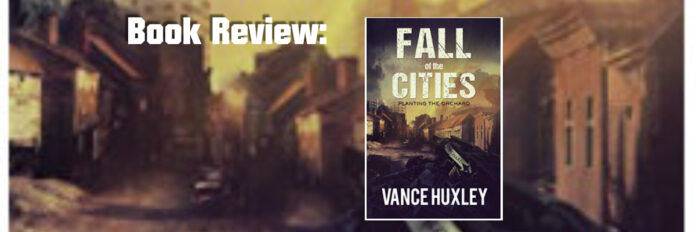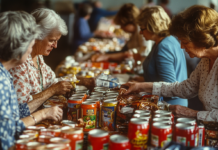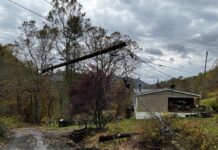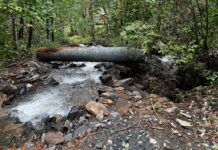It was a quiet day with snow, rain and freezing rain. I accomplished two things: I hung curtain rods for my wife’s draperies and I read about half of Fall of the Cities: Planting the Orchard by Vance Huxley.
The drapes, in case you were wondering, looked great.
A Bit About the Book
I got the book through a free link on Twitter a few weeks ago and downloaded to my tablet. I assume it was free because the author wants me to buy the other five books in the series. It was not given to me in exchange for this review, and is available for free to anyone who has Kindle Unlimited.
The first chapter had some formatting glitches, probably a problem with the ebook software, and for a little while, I thought, “Gee, this book is worth every penny I paid for it… meaning nothing.” But the problems disappeared by Chapter 2 and what started out as the story of a British soldier in Kuwait turned into a survival book directed related to urban survival. Now you’ve got my attention!
I read a great deal of survival and post-apocalyptic fiction, and I have to say that so far, this book is holding its own in a field that has many books but few truly noteworthy titles. I’m only 42 percent of the way through it, and I while am not yet ready to give it a ringing endorsement, it is readable and it has avoided some of the problems that you frequently see in prepper lit.
The Fall of the Cities – Book One
Our first introduction to a city is when our hero Harry and his military brethren are flown into Heathrow airport outside London to quell riots, which they have to do with rifles and bayonets, but no ammo. Before long their snipers are issued ammo and given permission to shoot rioters who have guns.
Why are people rioting? We don’t really know at first, but we learn with our characters that someone or something is going around blowing up refineries. There is still oil in the ground, but if no one can turn it into gasoline, diesel, or other fuels, life as we know it will pretty much grind to a halt.
It’s interesting to read a Brit book, not just because the settings and the jargon is different, but because the majority of the populace does not have guns. As a result, there are lots of battles where baseball and cricket bats are the weapon of choice. If this was taking place in the U.S., I expect it would be a somewhat different story, and possibly not in a good way.
It’s also interesting to compare the author’s ideas of rioting and looting in 2015, when the book was written, to what we have just seen in the U.S. In the book, there is looting, but little or no arson. They also haven’t cleaned out the stores. Looter take the booze, the drugs from the pharmacy, and the meat, but they leave the canned and dried foods for the taking. Really? Not in most cities I know. When a peaceful run on the market caused by COVID-19 can cause the shelves to empty in three days, I have a hard time believing that there’s plenty of edible food left after weeks of hardcore rioting.
Things Fall Apart… Very Slowly
In line with the food on the shelves, the author never seems to have heard that we are “nine meals away from anarchy,” meaning that once the trucks stop rolling we are three days away from lawlessness, disorder, and the rapid collapse of society. In the book, it appears to take weeks. Maybe it’s the British stiff upper lip?
The lead character seems a bit slow to catch on. How many times is he going to say, “We should get out of town,” before they actually leave? He could have saved them all a bunch of trouble and sorrow by leaving earlier. This guy is supposed to be a leader of men, but he can’t convince his sister to leave when the helicopter gun ships overhead start shooting civilians and the army planes drop napalm on their city? You’d think a military vet would be able to see the writing on the wall and make better, faster decisions.
For reasons that are yet unexplained, the British government seems to think that by blockading the cities and not letting anyone out they can quell, or at least contain, the violence. They actually surround cities at their beltways, using tanks to block highways and having checkpoints at all the routes out of the city. And yes, they do bomb their civilians. Yet this takes weeks to develop and everyone just stays home and boards up their windows.
Prepper vs Survivalist
While Harry is not a prepper, he is forced into the role of a survivalist after he leaves the army. He lacks the prepper mindset and makes multiple bad decisions, often choosing to fight when it would have been safer to pull back before anyone even thinks of fighting. I’m not saying that you should always run instead of fight, but bugging out is a valid prepper tactic for good reason: It gets you clear from ground zero and can increase your survivability.
I honestly cannot imagine anyone with the least bit of prepper perspective doing some of the stupid stuff Harry does. This makes the book a bit frustrating to read.
Alternative Perspectives
Still, one of the benefits of reading prepper lit or post-apocalyptic fiction is seeing how other people think and imagine how the world might fall apart. A sudden loss of gasoline production is not a scenario I had imagined, although it would certainly be a part of some scenarios.
I’ve seen a few hardcore preppers refer to non-preppers as “normies,” which always amuses me because it implies that prepping has become mainstream enough that there is an us and them to it. But I have to ask myself, is this how the normies would behave? Will they be too slow to react, so stuck in their normalcy bias they don’t realize they should get out of the city while they still can? Will they just keep going to the pharmacy and the market even when things run out, hoping something has changed?
I have to ask myself, is this what happened in Venezuela? Was the fall so slow, most people didn’t leave until it was too late? Is this story an example of the frog in the pot of water that gets boiled to death?
Folks, those of you who live in cities, let this be a lesson to you: Get out at the first sign of a disaster and go to your pre-arranged but out location. Yes, that could mean get out when they start blowing up the oil refineries, or the water pipelines, or the electrical generation, or the trucks stop rolling, and certainly get out before they start positioning tanks on the exit ramps to keep you from leaving town.
Rating: Three out of Five Pickles

Since there are six books in the series, we have to assume that Harry manages to survive and perhaps even manages to rescue his erstwhile girlfriend. I’ll finish this book, but it is yet to be seen whether or not I buy book two.








